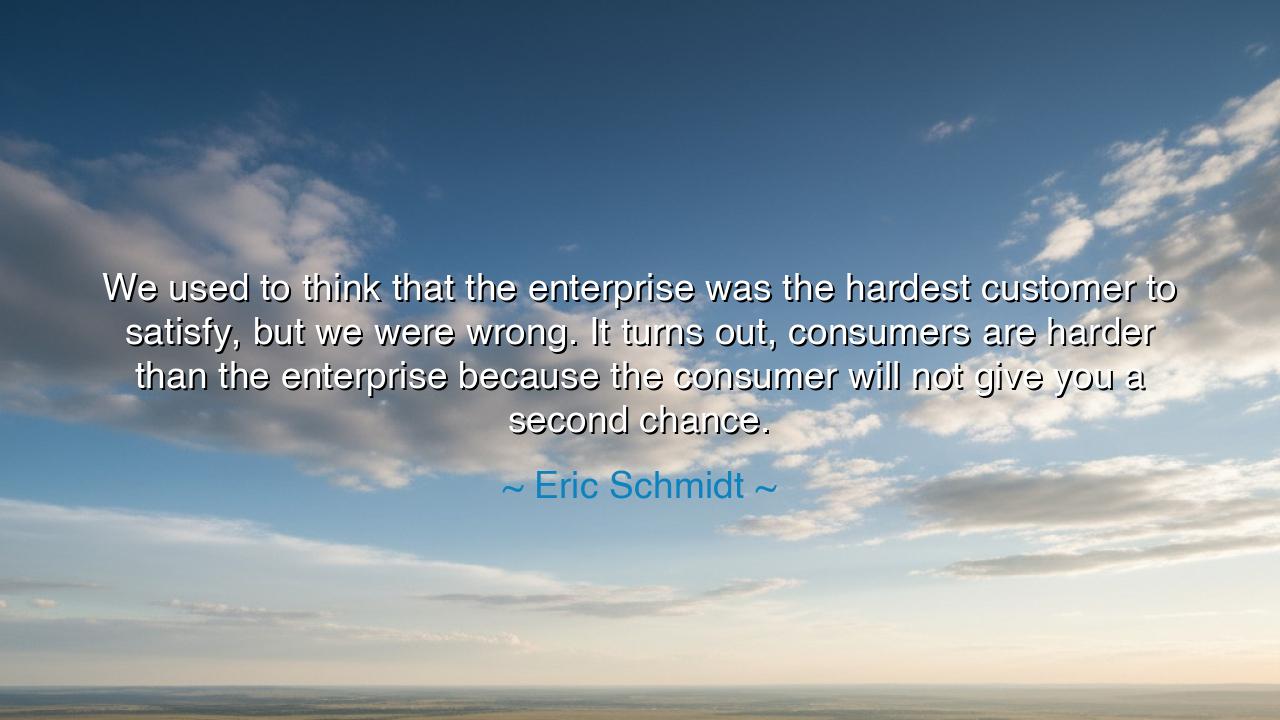
We used to think that the enterprise was the hardest customer to
We used to think that the enterprise was the hardest customer to satisfy, but we were wrong. It turns out, consumers are harder than the enterprise because the consumer will not give you a second chance.






In the ancient days, wisdom was passed down through stories of kings and emperors who sought to rule with fairness and foresight. Yet in all the tales of might and conquest, one truth was constant—the difficulty of satisfaction. Kings learned that it was not enough to win the favor of their people once; their hearts were fickle, and their loyalty had to be earned again and again. Eric Schmidt, a modern sage, speaks to this very truth when he reflects upon the changing nature of customer relations. "We used to think that the enterprise was the hardest customer to satisfy, but we were wrong. It turns out, consumers are harder than the enterprise because the consumer will not give you a second chance." In this simple yet profound statement, Schmidt captures the essence of a lesson as old as time itself: in the eyes of those who consume, the stakes are higher, and the chance to prove oneself is fleeting.
The enterprise, in all its formality and power, was once considered the pinnacle of challenge for those who sought to provide service or products. The needs of the enterprise were seen as intricate, demanding, and unyielding. Yet, over time, a new reality emerged. The common consumer—the everyday person—has proven to be even more elusive in their demands. They come not from the world of vast wealth or power, but from the tapestry of ordinary life. And yet, their expectations are no less demanding. For unlike the enterprise, which may offer second chances based on contracts and long-term agreements, the consumer of the modern world moves swiftly, and with them, so does their attention and their loyalty. If they are disappointed, they need not hesitate to turn to another. In this, we see the nature of customer satisfaction as a delicate dance—one that must be earned with care and attention, for the stakes are high and the time is short.
Consider the ancient merchants who stood at the crossroads of bustling marketplaces. In their hands, they held not just goods, but the trust of their customers. If their wares were found wanting, if their words proved false, the marketplace would swiftly turn against them. Their reputation was everything, and their survival depended on the quality of their products and their interactions. If a merchant faltered, the buyer would not hesitate to seek their needs elsewhere. This ancient truth has only deepened in our modern age, as the consumer of today moves not just through marketplaces but through the vast digital realms of the internet, where information spreads like wildfire, and where every mistake or disappointment is magnified.
A story from the modern world illuminates this truth. Blockbuster, once the king of video rentals, was slow to adapt to the rise of digital streaming, dismissing the shift as a passing trend. Yet, Netflix—a company born from the same age—seized the opportunity with swiftness and innovation. The consumer, fickle as the wind, had no patience for Blockbuster’s complacency. When they sought convenience and immediacy, they flocked to Netflix, and in doing so, turned their backs on Blockbuster. The company’s failure to adapt to the consumer's desires—a desire for accessibility and speed—led to its demise. The lesson here is clear: the consumer does not wait for second chances. They will move on to the next offering, the next possibility, and they will not look back.
This brings us to the heart of Schmidt’s wisdom: the consumer will not give you a second chance. In an age where time is precious and loyalty is fleeting, it is not enough to simply meet expectations once. One must continually strive for excellence in every interaction, every transaction, and every opportunity. The enterprise, with its contractual obligations and long-term relationships, may offer a path to recovery, but the consumer operates in a world where satisfaction is instantaneous, and the window for error is small. In this world, trust is built in moments, and it can be lost in an instant.
In our own lives, we must embrace this lesson. Whether we are entrepreneurs seeking to serve customers, individuals pursuing careers, or even in our relationships, we must understand that trust is a fragile thing. It is earned, and it can be lost with a single misstep. The world of the consumer, whether in business or in personal interactions, operates on an ever-changing, ever-demanding timeline. To succeed, we must give our best at every turn. Second chances are rare, and the expectations of the world grow ever more demanding. Let this truth guide us in all things: never rest on your laurels, never assume that the favor you have earned once will be easily regained. Work tirelessly, listen deeply, and offer your best at all times.
Thus, let us take this lesson to heart: The consumer, whether of goods or of time, will not wait. They are the pulse of the modern world, and their attention is both a gift and a challenge. To succeed, we must continually strive for excellence, for once trust is broken, it is difficult to rebuild. In all things, whether in business, in relationships, or in our pursuit of greatness, let us understand that our actions must always align with the needs and expectations of those we serve. In doing so, we may find not only success, but a lasting place in the hearts and minds of those we seek to impact.






AAdministratorAdministrator
Welcome, honored guests. Please leave a comment, we will respond soon